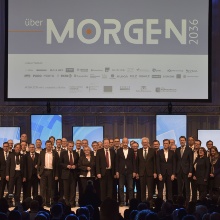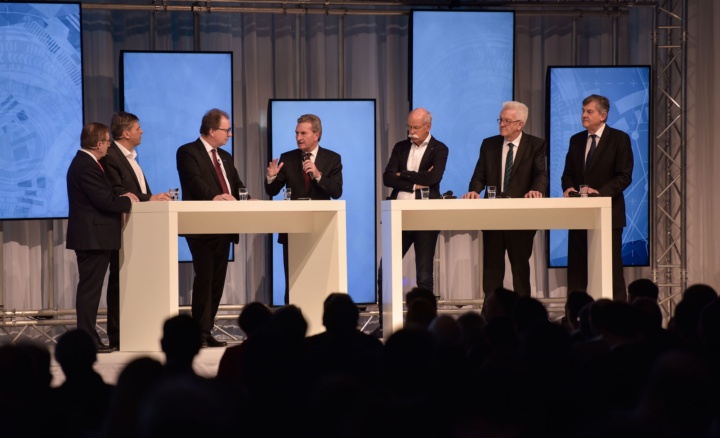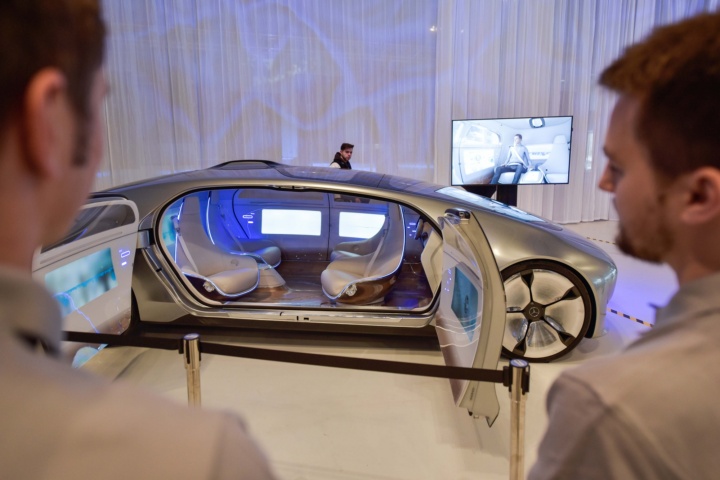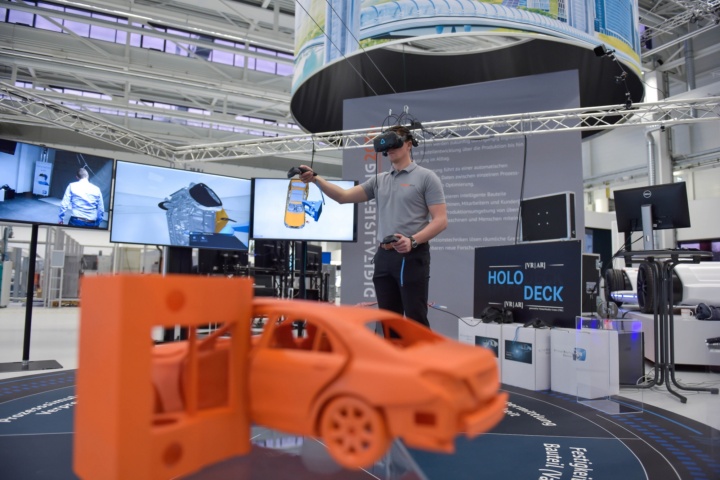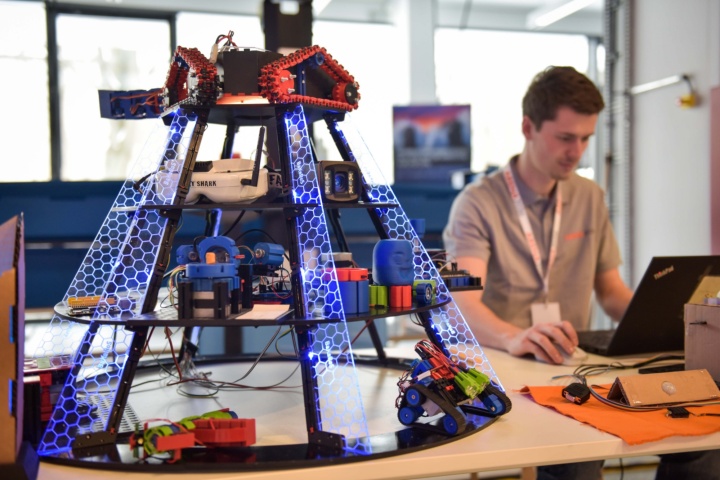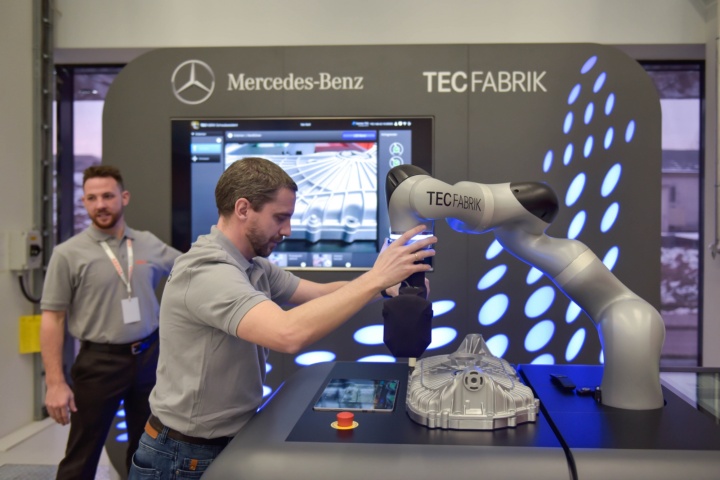- For the ARENA2036 research campus, the University of Stuttgart supported by the European Fund for Regional Development (EFRE) has constructed one of the world's largest, most modern and flexible research facilities for production and mobility.
- In the research areas of production and work as well as mobility in the context of digitisation, new ideas are being created for the cutting-edge scientific and technological developments of the day after tomorrow.
- At the event "Tomorrow" 800 prominent guests from the sciences, industry and politics will be able to experience the future in the ARENA2036 research campus.
- Part of the show among others will be panel discussions with EU Commissioner Günther H. Oettinger, the Minister President of Baden-Württemberg, Winfried Kretschmann, the Dean of the University of Stuttgart, Prof. Wolfram Ressel and the Chairman of the Board of Management of Daimler AG and Head of Mercedes-Benz Cars, Dr. Dieter Zetsche, as well as scientists and future researchers in the fields of mobility and production.
In the context of digitisation in the automobile industry, the ARENA2036 research campus has become a lighthouse institution in the fields of production, work and the mobility of the future. ARENA2036 is the world's largest and leading research campus for transformable production including functionally integrated lightweight construction. Around one year after moving into a modern building complex, and a good five years after its foundation, ARENA2036 will hold the two-day event "Tomorrow" on 22th of February 2018 to present the results and visions achieved to date: On invitation of Prof. Wolfram Ressel, Dean of the University of Stuttgart and Markus Schäfer, Member of the Divisional Board of Mercedes-Benz Cars, Production and Supply Chain, politicians, representatives of the automobile industry and scientists will discuss the production and mobility of the future with experts from various disciplines. These include Günther H. Oettinger, EU Commissioner for Budget and Human Resources, Winfried Kretschmann, Minister President of Baden-Württemberg, Dr. Dieter Zetsche, Chairman of the Board of Management of Daimler AG and Head of Mercedes-Benz Cars, Dr. Michael Bolle, Head of Research and Advance Engineering at Robert Bosch GmbH, and Bernd Becker, Chief Technology Strategist of automotive supplier FARO. Afterwards, ARENA2036 will give an insight into the four research areas of Production2036, Work2036 and Mobility2036 as well as Digitisation2036 as a cross-sectional topic. On the second day, 23 February, the exhibition in the research campus will be open to the public.
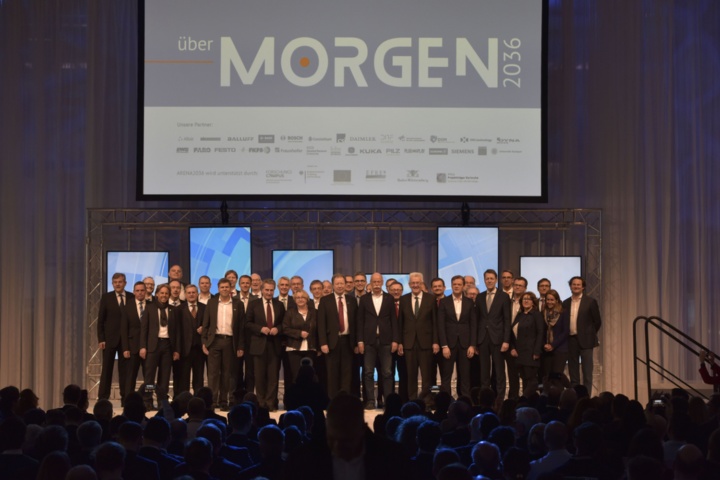
"ARENA2036 not only strengthens the Stuttgart region and Germany as an industrial cluster with its inter-disciplinary research, but also ensures an optimal technology transfer with its innovative and pioneering model of cooperation under one roof. It is good to see so many guests coming to our research factory at the University of Stuttgart to witness the results from the first five years of fascinating shared effort", Prof. Wolfram Ressel commented on the event referring to the positive experiences and results of the first phase in these joint projects.
"With their innovations, Gottlieb Daimler and Carl Benz have started a revolution of mobility all over the world. In Baden-Württemberg, we have great opportunities for innovation with a unique cluster of cutting-edge technologies that is unique in the world: suppliers, technology companies and automobile manufacturers. Nowadays, with digitisation profound changes are taking place extremely fast. The global automotive industry therefore needs strong and unconventional answers to the visionary questions of mobility and the future of work. One of them is ARENA2036," explained Markus Schäfer, Member of the Divisional Board of Management of Mercedes-Benz Cars, Production and Supply Chain, and patron of ARENA2036.
Important meaning for Germany as a scientific and industrial location
At ARENA2036, 31 partners working under one roof on the Vaihingen campus of the University of Stuttgart combine fundamental scientific research with industrial applications. Hosting an area of 10,000 sq. m. each partner is working on pre-competitive solutions which could be used for its own applications. The interplay between a wide range of disciplines and areas of expertise creates scope for innovative ideas. The "Tomorrow" event provides a unique insight into topics and projects of the partners.
“ARENA2036 shows in an exemplary way how successful cooperation between university research institutions and the automotive industry can find innovative answers to the challenges of mobility of the future across industry boundaries," said Minister President Winfried Kretschmann. “Politicians can provide incentives for technological developments and promising networks. For this reason, for example, the state government has also initiated the strategic dialogue on the automotive industry in order to contribute its share in shaping the future of the mobility sector.”
Dr. Georg Schütte, State Secretary at the German Federal Ministry of Education and Research, acknowledges ARENA2036 as an outstanding example for close and long-term collaboration between science and industry: "With the Research Campus Initiative, we are promoting a new type of strategic cooperation between science and industry at selected locations in Germany. In Stuttgart, the ARENA2036 research factory redesigns and implements the entire value chain of the fully digitized vehicle. In this way, the future of mobility and production will be fundamentally re-imagined. We consider this model groundbreaking and will expand it to other research areas as well."
ARENA2036 research campus: fast-moving development during the first project phase
ARENA2036 is sponsored by the Federal Ministry of Education and Research (BMBF) as part of the programme "Research campus – public and private partnership for innovations". BMBF supports the research campus, which was chosen by an independent jury, with up to two million euros annually over a period of up to 15 years.
ARENA2036 was already founded in 2013 by seven founding members: the University of Stuttgart, the German Institute for Textile and Fibre Research in Denkendorf, the German Centre for Aerospace, the Fraunhofer Society, Daimler AG, BASF SE and Robert Bosch GmbH. Since then, the number of partners has increased to 31 – from suppliers and IT service providers to automobile manufacturers and research institutes. Under the roof of ARENA2036, science and industry work hand in hand together and inspire each other. In line with the motto "Industry on Campus", the partners of ARENA2036 "join.create.move.".
The research portfolio has developed at breakneck speed since 2013. Around 90 research projects have been initiated during this first sponsoring phase. Experts employed by the partners are now researching in a highly modern working environment. The construction cost of around 30 million euros for the research campus was half financed by the University of Stuttgart and half by the EFRE fund of the European Community. ARENA2036 will enter the second project phase this year. An initial outlook is given at the topic bays presented at the event.
Themed worlds – ARENA2036 researches into mobility, production, digitisation and work
Peter Froeschle, General Manager of ARENA2036, finally took the guests into the future – illustrated by the four topic bays Production2036, Work2036 and Mobility2036 with Digitisation2036 as cross-sectional topic. These are all interlinked, and have project-related interfaces. Within the individual research areas, interaction and the exchange of project results lead to new concepts, technologies and follow-up projects. The research and development for modern Industry 4.0 applications and intuitive technologies focusing on human beings also play an important role.
The research area Mobility2036 focusses on innovative, vehicle-related technologies – from the development of functionally integrated and intelligent components to future-oriented materials and connectivity for the customer. Vehicles of the future will be lighter in weight, consume less energy and consist of fewer components. Structures, functions and design will change. The focus is always on the needs of users. Current technology aspects such as connectivity, autonomous driving, sharing services and electric drive systems are the starting point for the future research activities of ARENA2036 in the area of Mobility2036. Fundamental research also provides a basis for the development of new mobility concepts.
Another research area of ARENA2036 is dedicated on full digitisation of process chains and their simulation. All the stages are digitally represented, from component development and every production stage to the use of a vehicle by the customer. This means that data from the individual process steps can be automatically transferred and used for improvements. In the future, intelligent components will therefore communicate with production machinery, employees and customers – so in the production environment of the day after tomorrow, all components, machines and employees will be connected. The aim is to predict impending challenges more rapidly, and optimise the quality of processes and products. In this way digitisation and Big Data will become the drivers of innovation activities.
Communication between people and machines – with and amongst each other – is the subject matter of the research area Work2036. Artificial Intelligence will become the interface bringing two worlds together with different languages, and helps them to understand each other. Research into semantic inter-relationships will enable human knowledge to be linked to databases throughout the world. Particularly where information from other sectors is concerned, Artificial Intelligence will help people to select, transform and implement mobility and production research. Another research aspect of Work2036 covers the way in which we work together – more interactively, internationally and creatively.
The Production2036 area shows perspectives for future innovative production. The idea: The Industry 4.0 production comprises a modular structure with a wide range of workstations that are intelligently networked by sensors. Within the workstations, employees can flexibly combine different machines. In this way they can design the production environment themselves. They can arrange tools, robots and machines in accordance with their own needs and the continuously changing production programme. In this way the workplace of the future will be more flexible and demand-related. Intelligent components will communicate with production machinery and employees, exchanging information within a virtual network.
Contacts
Melanie Löbel
ARENA2036 e.V. | Marketing Management
+49 (711) 685-68368 | melanie.loebel@ARENA2026.de | www.ARENA2036.de
Dr. Hans-Herwig Geyer
University of Stuttgart | Head of University Communication and press spokesman
+49 (711) 685-8-2555 | leitung.hkom@hkom.uni-stuttgart.de | www.uni-stuttgart.de
Stefanie Krugsberger
Daimler AG | Global Business Communications Mercedes-Benz Cars | Corporate Communication
+49 (711) 17-45892 | stefanie.krugsberger@daimler.com | www.daimler.com


